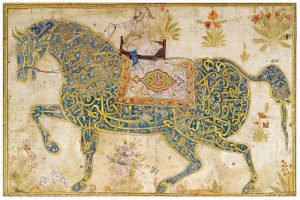
(Please click on the image to enlarge it.)
Several years ago, I wrote the article on Allah for the Encyclopedia of Islam and the Muslim World, and, now, I’ve revised that article for the Encyclopedia‘s forthcoming second edition.
Today, I gave final approval to a very short sidebar that will accompany my main entry. This is how it reads:
The Throne Verse
The Qur’an’s famous Throne Verse (2:255) offers a fine summary of basic Islamic teaching regarding God.
“Allah! There is no god but he, the Living, the Everlasting. Neither slumber nor sleep seizes him. His are all things in the heavens and the earth. Who is there who can intercede with him, except by his leave? He knows what is before them and what is behind them, while they comprehend nothing of his knowledge except as he wills. His throne extends over the heavens and the earth. Sustaining them does not burden him, for he is the Most High, the Supreme.”
Perhaps the most popular and beloved passage in the Qur‘an, this often-memorized assertion of God’s universal dominion is a favorite of artists across the Islamic world. Tradition credits it with a special saving power and reports that the prophet Muhammad himself considered it the greatest verse revealed to him. The depth of Muslim devotion to Allah is apparent virtually everywhere in Islamic life, including even in the use of elaborate calligraphic renditions of the word Allah as architectural and artistic ornamentation.
I couldn’t help but contrast that rather sublime subject with the horrific ugliness perpetrated today — and I mean this very day — in the name of Islam:
http://www.cnn.com/2015/06/26/africa/tunisia-terror-attack/
As a non-Muslim who regards Islam with respect and, on several levels, with admiration, I hope and pray that Muslims will be able to rid Islam of the toxins of extremism. The world of Islam desperately needs this. The world in general does.










